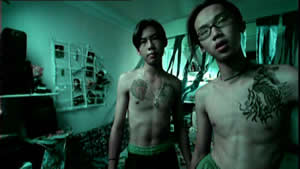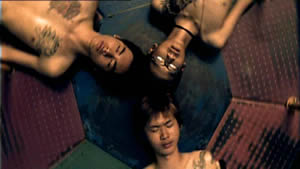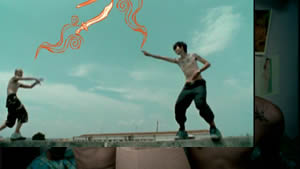Fifteen (15) - Royston Tan

- Made: 2003
- Format: DVD
- Region: PAL Region 0
- Release Date: 16 May 2005
- Company: Peccadillo Pictures
- Length: 92 mins
- Picture: Anamorphic 16:9 widescreen
- Sound: DD5.1, DTS
- Language: Mandarin and Hokkein with English subtitles
- Extras: Commentary, Deleted Scenes, Interviews and trailers
- Classification: 18
Director:
Royston Tan
Cast:
Melvin Chen, Vynn Soh, Melvin Lee, Shaun Tan, Erick Chun
Fifteen (15) – Whilst Japan and China are firmly established players in world cinema, with Korea fast making a name for itself, other East Asian countries have yet to enjoy such a presence. From Singapore comes the teen-punk rebel picture, 15.
Plot:
Melvin (Chen), Vynn (Soh), Armani (Melvin Lee), Erick and Shaun (Tan) are all fifteen-year-old gangsters in Singapore. They get into fights, worry about school and take drugs, but mostly they lounge about being teenagers, topless and smoking.



Film:
Fifteen is full of stylistic flourishes. Slow motion, sped-up footage, reverse playback, numerous film stocks, music video interludes, video games pastiches and every so often the screen will flash with cod-philosophical slogans whilst the boys pull poses like a perfume ad. While Fifteen is rarely boring, that doesn't mean it's good. There is one stomach churning scene where one of the boys swallows numerous condoms stuffed with pills – make sure you've not eaten recently should you decide to watch it - and depending on your feelings about piercings and self-harm there are a couple of other scenes you may want to avoid.
The only women in the film are middle-aged ladies who get picked on by the boys on a bus and in a lift – despite the mention of girlfriends and the boys watching straight porn (from the screen's perspective – sound only) there are no girls to be found, which seems odd for a film about teen boys, except for a roof-top suicide who we only see after she hits the pavement. On the whole the acting is pretty poor, unless the monotonous delivery was intentional, though to be fair these are first time, non-professional actors.



The director's admiration for the young men is obvious, as the skinny pretty boys prance around topless and pouting for the most of the film. After no less than three long shots of three of the boys crying, Royston's fondness for this phenomenon in particular is explicitly emphasised by the line “Men's tears are precious. Don't waste it.” at the end. There's nothing wrong with a film that so lovingly looks at the bodies of teen boys, after all Hollywood is chock full of excuses to ogle teen girls, but it's odd that a film which sets out to shock and be on the ‘cutting edge' seems to still be in the closet. There are plenty of films based on growing pains, often with boys as the focus with little time spent with females, but rarely do they dwell on scenes of effeminate tenderness without inklings of same-sex relationships bubbling under the surface.



Disc:
The director's commentary gives a fair amount of background behind the filming, but doesn't offer any explanations for choice of style and content beyond pointing out the parts that the boys ad-libbed, and the commentary inexplicably halts for around the last half hour. There are two deleted scenes that don't really seem to have needed deleting, seeing as the film doesn't really have a plot. One does includes crying so maybe Royston thought it was overdoing the anti ‘boys don't cry' angle.
The nine minute interview with the producer and director does feature the director mentioning that some scenes could be labelled as homosexual or queer, but explains that they are in fact just expressions of intimacy or comfort, moments which seldom happen in the boys lives, especially as they are usually trying to project a tough, masculine front to fit the gangster image. The extras are topped off with the original trailer, accompanied by no less than fourteen trailers for other features in Pecadillo's stable.



Overall:
Fifteen does present an intimate snapshot of the teen boys left behind by Singapore's education system that is no doubt rare (the director explains that if kids find themselves on the lower tier after they are split into two streams in their early teens, they often give up, feeling themselves worthless, and some even kill themselves.), but in the end it feels like a coating of stylistic bells and whistles around so much nothing. It may achieve a particular resonance for those familiar with Singaporean culture, but with their boy-band looks and the film's (mostly) glossy treatment, it is hard to feel particularly moved by it.
Ross



